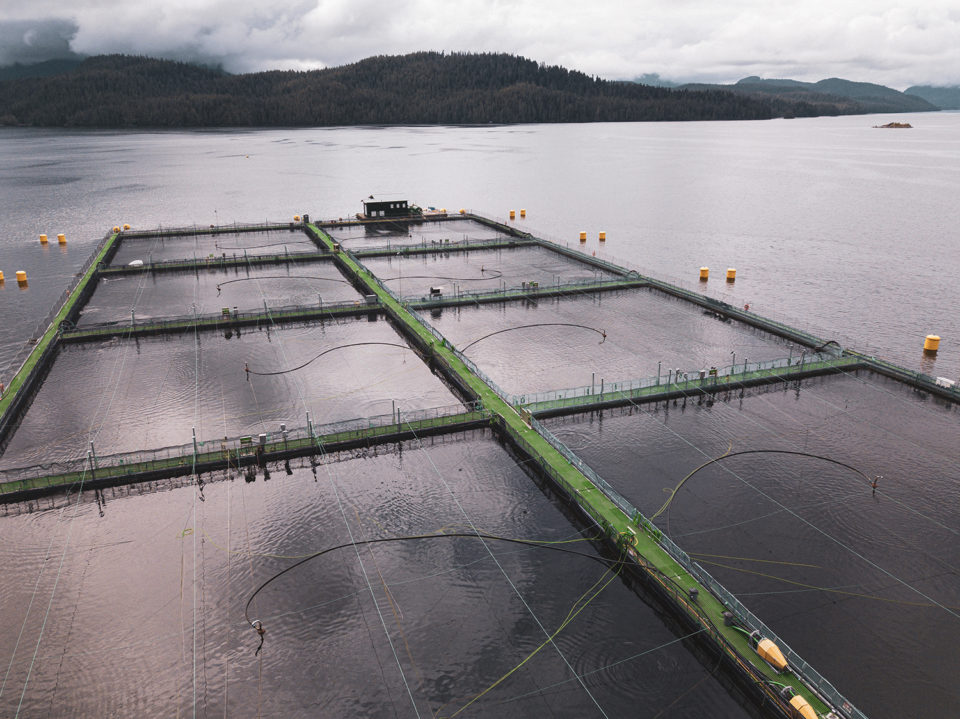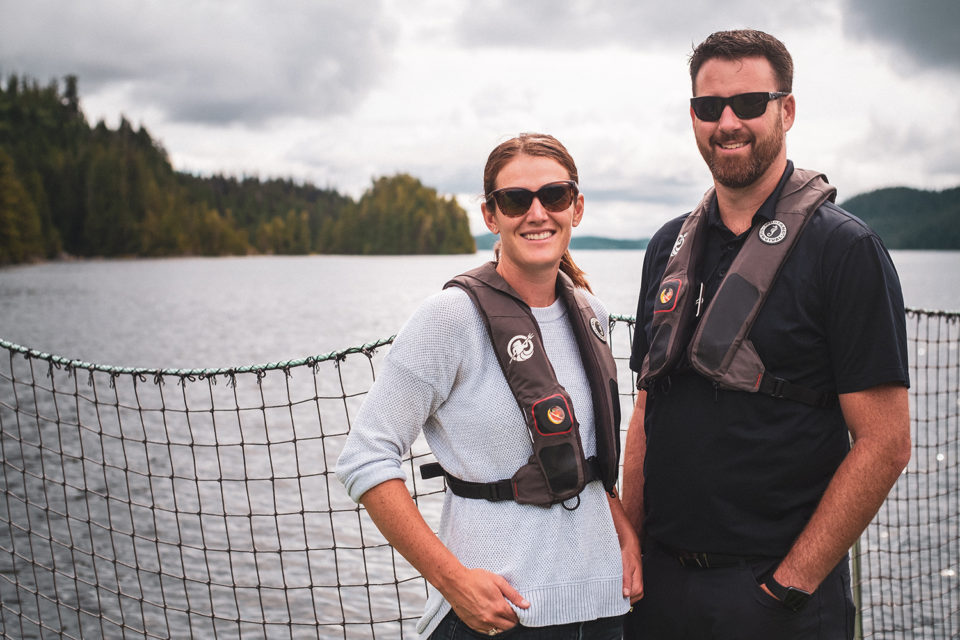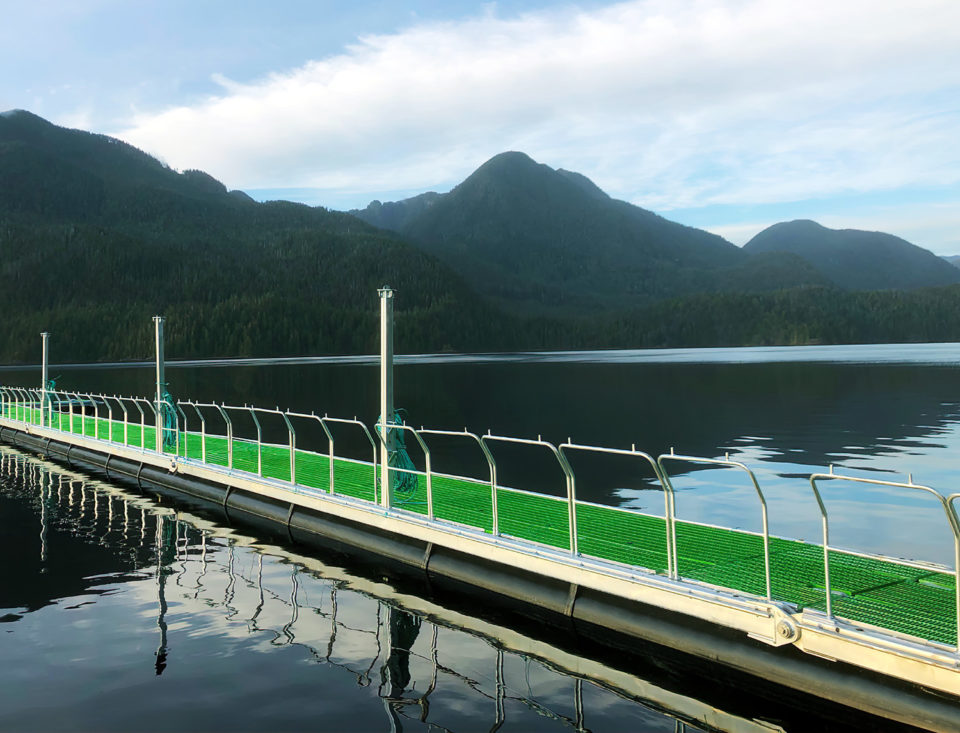Poseidon Ocean Systems’ floating closed-containment structures garner interest in Canada, Scotland

A former Marine Harvest engineer believes there’s a better way to build a fish pen and now his small British Columbia company has the funding to prove it.
Poseidon Ocean Systems, based in Campbell River, was founded in 2015 by husband-and-wife team Matt and Heather Clarke with the goal of making improvements to aquaculture operations. Matt, who for four years served as head of engineering for Marine Harvest (now Mowi Canada West), took note of the engineering gaps he witnessed in operations.
“The industry is tightly knit here in B.C., and I knew the problems we were facing at Mowi were also being faced by other producers,” he said. “I felt the industry needed better solutions than what it had access to at that time. I saw aquaculture producers being forced to adopt solutions or pieces of equipment from other industries to solve problems like aeration. Those solutions weren’t intended for aquaculture, so I could see there was lots of room for improvement.”
Poseidon recently raised $5 million in funding from Ag Capital Canada (ACC) and Export Development Canada. The funds will give Poseidon the boost it needs to build inventory, enhance its engineering innovations and increase its international sales efforts.
The couple worked solo for the first year before bringing on additional staff. Today their team, which includes 15 engineers in its staff of 24, has two major aquaculture innovations under its belt. The Trident Hybrid™ Steel Cage System is a floating steel structure designed to withstand harsh ocean conditions while improving worker safety, stability and systems integration.
“As this new technology evolves it will make floating closed-containment cheaper to adopt and easier to deploy and operate,” Matt Clarke said. Cermaq Canada was the first customer for the system in 2019 and Poseidon is installing a second cage system in Scotland this month.

The Flowpressor™ compressor system, its second innovation provides aeration and oxygenation for sea pens in support of algae and plankton mitigation, sea lice treatments, superchill prevention, warm water mitigation, aeration and oxygenation. It improves water quality while reducing diesel fuel consumption by up to 56 percent. Designed to lower the carbon footprint of off-grid aquaculture operations, it’s been purchased by Cermaq Canada and other customers have signed up for trial.
“As a platform it will lead to dramatic reductions in cost for most of the core systems on a farm: feed systems, oxygenation systems and compressors,” he said. “It’s a clean technology advancement we’re quite proud of. But both of these new technologies have a lot more potential than their first versions. The idea is to use the funding from ACC and EDC to continue their development and bring these technologies to market. We believe both have potentially big impacts for the aquaculture industry.”
The funding is crucial for the company’s growth, according to Heather Clarke.
“It gives us the confidence and strength to build an inventory, to keep our engineers working on the advancement of these two platforms, and to accelerate our international growth by hiring international sales and support staff,” she said. “It also gives us the strength to prove the technology, because sometimes you need to be able to show it to customers instead of just telling them about it. With this money we’ll be able to deploy the Flowpressor™ in a trial or test application.”

Until now, scaling up has been a challenge, particularly during COVID-19, she admitted: “We were a small company when we started developing these products and we had to compete with some big industries in big markets. To have the strength of this investment behind us gives us customers more confidence that they’ll get what they’re looking for from us.”
Ag Capital Canada is a new, Ontario-based fund, launched in March 2020, and Poseidon is their first investment in aquaculture. John Lansink, managing partner, said the fund is focused on agro business, agro tech and agro food. “Poseidon touches on all three, but specifically on the innovation side,” Lansink said. “They’re focused on making products better for the aquaculture industry, which we see as a great industry and a growing one, not just in Canada but around the world.” The fund seeks to invest between $2 million and $4 million per investment.
Heather Clarke said ACC was “the perfect choice to lead our Series A” due to their focus on food production in Canada, the advancement of agricultural technologies and entrepreneurship. “All the partners were involved in their own agriculture-related business and their collective experience will really help us as we grow our business, navigate regulatory challenges and learn how to scale the business from a family-run organization into a more international company,” she said.
“Five years from now we expect to see our technologies become a common fixture in aquaculture operations around the world,” Matt Clarke said. “We’ve established sales partners in Chile and Scotland. That was step one. Step two is to continue to get the word out through word-of-mouth.”
Which he doesn’t anticipate being a problem: “As a supplier, when you produce a solution that actually works, word travels fast.”
Follow the Advocate on Twitter @GAA_Advocate
Now that you've finished reading the article ...
… we hope you’ll consider supporting our mission to document the evolution of the global aquaculture industry and share our vast network of contributors’ expansive knowledge every week.
By becoming a Global Seafood Alliance member, you’re ensuring that all of the pre-competitive work we do through member benefits, resources and events can continue. Individual membership costs just $50 a year. GSA individual and corporate members receive complimentary access to a series of GOAL virtual events beginning in April. Join now.
Not a GSA member? Join us.
Author
-

Lauren Kramer
Vancouver-based correspondent Lauren Kramer has written about the seafood industry for the past 15 years.
Tagged With
Related Posts

Health & Welfare
Sizing up TiLV and its potential impact on tilapia production
An international research effort has commenced to find a solution for Tilapia Lake Virus (TiLV), a contagion causing high rates of mortality in farmed and wild tilapia stocks in Israel, Colombia, Ecuador, Egypt and Thailand.

Innovation & Investment
Israeli firm’s ‘plug-and-play’ RAS solution attracts investment
BioFishency's two products, the Single Pass BioFilter and the Mini-RAS, each aim to improve the survival, growth and reproduction rates of fish, which increases profitability and sustainability for the farmer.

Health & Welfare
Israeli firms developing oral medicines for shrimp and finfish aquaculture
Israeli companies ViAqua Therapeutics and TransAlgae say their orally administered medicines for shrimp and fish aquaculture are in the pipeline.

Intelligence
COVID-19 has the West Coast shellfish sector on hold
The impacts of the coronavirus (COVID-19) pandemic on the industry are vast. In the Pacific Northwest, some producers are faring better than others.

